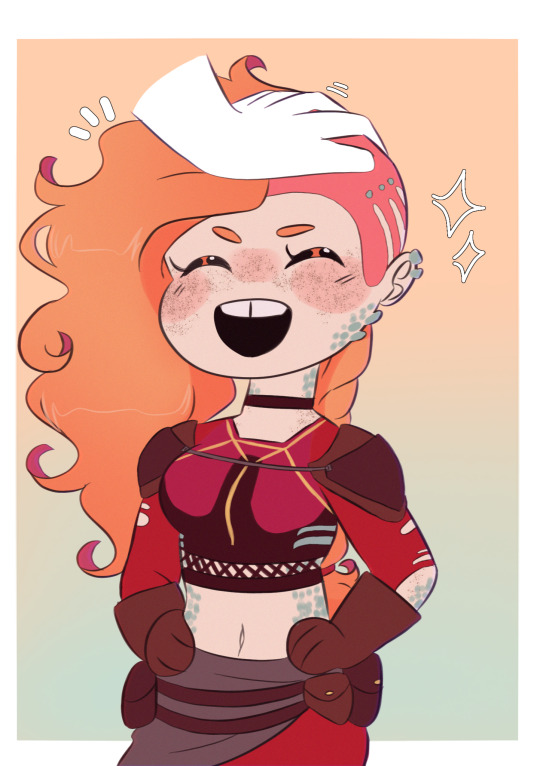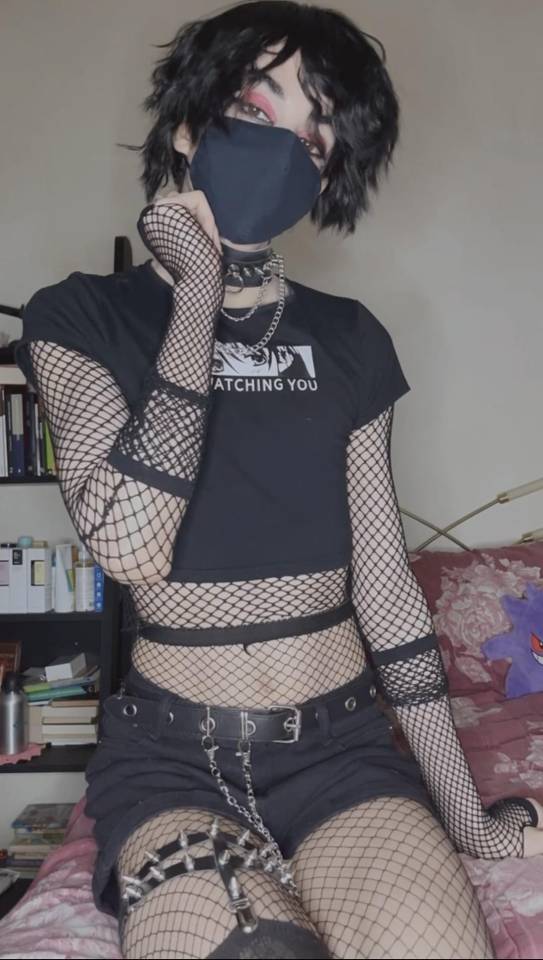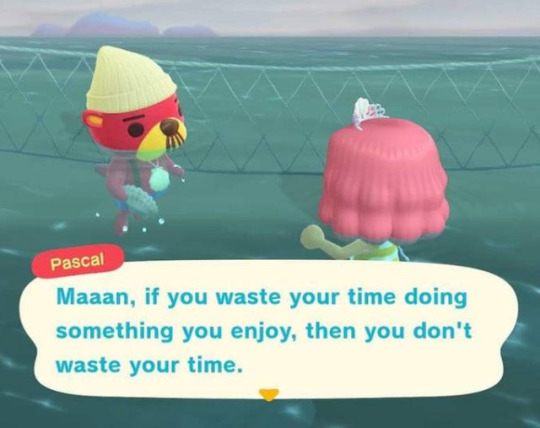Text
Hey bro would you do me a platonic solid
162K notes
·
View notes
Text

quick chibi Nem drawing
ok, so, i noticed while drawing the piece in my most recent post that it was not the second, but third time i drew Nemmie crying. That very much didn't sit right with me so have chibi her getting some head pats
116 notes
·
View notes
Text
May your next period be light and end quickly
889K notes
·
View notes
Text
How To Make Your Writing Less Stiff 5
Movement
Dredging this back up from way back.
Make sure your characters move, but not too much during heavy dialogue scenes. E.g. two characters sitting and talking—do humans just stare at each other with their arms lifeless and bodies utterly motionless during conversation? No? Then neither should your characters. Make them…
Gesture
Wave
Frown
Laugh
Cross their legs/their arms
Shift around to get comfortable
Pound the table
Roll their eyes
Point
Shrug
Touch their face/their hair
Wring their hands
Pick at their nails
Yawn
Stretch
Sniff/sniffle
Tap their fingers/drum
Bounce their feet
Doodle
Fiddle with buttons or jewelry
Scratch an itch
Touch their weapons/gadgets/phones
Check the time
Get up and sit back down
Move from chair to tabletop
The list goes on.
Bonus points if these are tics that serve to develop your character, like a nervous fiddler, or if one moves a lot and the other doesn’t—what does that say about the both of them? This is where “show don’t tell” really comes into play.
As in, you could say “he’s nervous” or you could show, “He fidgets, constantly glancing at the clock as sweat beads at his temples.”
This site is full of discourse on telling vs showing so I’ll leave it at that.
Epithets
In the Sci-fi WIP that shall never see the light of day, I had a flashback arc for one male character and his relationship with another male character. On top of that, the flashback character was a nameless narrator for Reasons.
Enter the problem: How would you keep track of two male characters, one who you can't name, and the other who does have a name, but you can’t oversaturate the narrative with it? I did a few things.
Nameless Narrator (written in 3rd person limited POV) was the only narrator for the flashback arc. I never switched to the boyfriend’s POV.
Boyfriend had only a couple epithets that could only apply to him, and halfway through their relationship, NN went from describing him as “the other prisoner” to “his cellmate” to “his partner” (which was also a double entendre). NN also switched from using BF’s full name to a nickname both in narration and dialogue.
BF had a title for NN that he used exclusively in dialogue, since BF couldn’t use his given name and NN hadn’t picked a new one for himself.
Every time the subject of the narrative switched, I started a new paragraph so “he” never described either character ambiguously mid-paragraph.
Is this an extreme example? Absolutely, but I pulled it off according to my betas.
The point of all this is this: Epithets shouldn’t just exist to substitute an overused name. Epithets de-personalize the subject if you use them incorrectly. If your narrator is thinking of their lover and describing that person without their name, then the trait they pick to focus on should be something equally important to them. In contrast, if you want to drive home how little a narrator thinks of somebody, using depersonalizing epithets helps sell that disrespect.
Fanfic tends to be the most egregious with soulless epithets like "the black-haired boy" that tell the reader absolutely nothing about how the narrator feels about that black-haired boy, espeically if they're doing so during a highly-emotional moment.
As in, NN and BF had one implied sex scene. Had I said “the other prisoner” that would have completely ruined the mood. He’s so much more than “the other prisoner” at that point in the story. “His partner,” since they were both a combat team and romantically involved, encompassed their entire relationship.
The epithet also changed depending on what mood or how hopeless NN saw their situation. He’d wax and wane over how close he believed them to be for Reasons. NN was a very reserved character who kept BF at a distance, afraid to go “all in” because he knew there was a high chance of BF not surviving this campaign. So NN never used “his lover”.
All to say, epithets carried the subtext of that flashback arc, when I had a character who would not talk about his feelings. I could show you the progression of their relationship through how the epithets changed.
I could show you whenever NN was being a big fat liar about his feelings when he said he's not in love, but his narration gave him away. I could show you the exact moment their relationship shifted from comrades to something more when NN switched mid-paragraph from "his cellmate" to "his partner" and when he took up BF's nickame exclusively in the same scene.
I do the same thing in Eternal Night when Elias, my protagonist, stops referring to Dorian as "it" and "the vampire" instead of his name the moment they collide with a much more dangerous vampire, so jarringly that Elias notices in his own narration—the point of it being so explicit is that this degredation isn't automatic, it's something he has to conciously do, when everyone else in his clan wouldn't think twice about dehumanizing them.
—
Any literary device should be used with intent if you want those layers in your work. The curtains are rarely just blue. Whether it’s a simile with a deliberate comparison or an epithet with deliberate connotations, your readers will pick up on the subtext, I promise.
4K notes
·
View notes
Text
Back on my exocolonist shit.
Oc content soon, trust
3 notes
·
View notes
Text
How to make your writing sound less stiff part 2
Part 1
Again, just suggestions that shouldn’t have to compromise your author voice, as I sit here doing my own edits for a WIP.
1. Crutch words
Specifically when you have your narrator taking an action instead of just… writing that action. Examples:
Character wonders/imagines/thinks/realizes
Character sees/smells/feels
Now not all of these need to be cut. There’s a difference between:
Elias stops. He realizes they’re going in the wrong direction.
And
Elias takes far too long to realize that it’s not horribly dark wherever they are
Crutch words are words that don’t add anything to the sentence and the sentence can carry on with the exact same meaning even if you delete it. Thus:
Elias stops. They’re going in the wrong direction.
I need a word in the second example, whether it’s realizes, understands, or notices, unless I rework the entire sentence. The “realization” is implied by the hard cut to the next sentence in the first example.
2. Creating your own “author voice”
Unless the tone of the scene demands otherwise, my writing style is very conversational. I have a lot of sentence fragments to reflect my characters’ scatterbrained thoughts. I let them be sarcastic and sassy within the narration. I leave in instances of “just” (another crutch word) when I think it helps the sentence. Example:
…but it’s just another cave to Elias.
Deleting the “just” wouldn’t hit as hard or read as dismissive and resigned.
I may be writing in 3rd person limited, but I still let the personalities of my characters flavor everything from the syntax to metaphor choices. It’s up to you how you want to write your “voice”.
I’ll let dialogue cut off narration, like:
Not that he wouldn’t. However, “You can’t expect me to believe that.”
Sure it’s ~grammatically incorrect~ but you get more leeway in fiction. This isn’t an essay written in MLA or APA format. It’s okay to break a few rules, they’re more like guidelines anyway.
3. Metaphor, allegory, and simile
There is a time and a place to abandon this and shoot straight because oftentimes you might not realize you’re using these at all. It’s the difference between:
Blinding sunlight reflects off the window sill
And
Sunlight bounces like high-beams off the window sill
It’s up to you and what best fits the scene.
Sometimes there’s more power in not being poetic, just bluntly explicit. Situations like describing a character’s battle wounds (whatever kind of battle they might be from, whether it be war or abuse) don’t need flowery prose and if your manuscript is metaphor-heavy, suddenly dropping them in a serious situation will help with the mood and tonal shift, even if your readers can’t quite pick up on why immediately.
Whatever the case is, pick a metaphor that fits the narrator. If my narrator is comparing a shade of red to something, pick a comparison that makes sense.
Red like the clouds at sunset might make sense for a character that would appreciate sunsets. It’s romantic but not sensual, it’s warm and comforting.
Red like lipstick stains on a wine glass hints at a very different image and tone.
Metaphor can also either water down the impact of something, or make it so much worse so pay attention to what you want your reader to feel when they read it. Are you trying to shield them from the horror or dig it in deep?
4. Paragraph formatting
Nothing sticks out on a page quite like a line of narrative all by itself. Abusing this tactic will lessen its effect so save single sentence paragraphs for lines you want to hammer your audiences with. Lines like romantic revelations, or shocking twists, or characters giving up, giving in. Or just a badass line that deserves a whole paragraph to itself.
I do it all the time just like this.
Your writing style might not feature a bunch of chunky paragraphs to emphasize smaller lines of text (or if you’re writing a fic on A03, the size of the screen makes many paragraphs one line), but if yours does, slapping a zinger between two beefy paragraphs helps with immersion.
5. Polysyndeton and Asyndeton
Not gibberish! These, like single-sentence paragraphs, mix up the usual flow of the narrative that are lists of concepts with or without conjunctions.
Asyndeton: We came. We saw. We conquered. It was cold, grey, lifeless.
Polysyndeton: And the birds are out and the sun is shining and it might rain later but right now I am going to enjoy the blue sky and the puffy white clouds like cotton balls. They stand and they clap and they sing.
Both are for emphasis. Asyndeton tends to be "colder" and more blunt, because the sentence is blunt. Polysyntedon tends to be more exciting, overwhelming.
We came and we saw and we conquered.
The original is rather grim. This version is almost uplifting, like it's celebrating as opposed to taunting, depending on how you look at it.
—
All of these are highly situational, but if you’re stuck, maybe try some out and see what happens.
*italicized quotes are from ENNS, the rest I made up on the spot save for the Veni Vidi Vici.
2K notes
·
View notes
Text
How to make your writing sound less stiff
Just a few suggestions. You shouldn’t have to compromise your writing style and voice with any of these, and some situations and scenes might demand some stiff or jerky writing to better convey emotion and immersion. I am not the first to come up with these, just circulating them again.
1. Vary sentence structure.
This is an example paragraph. You might see this generated from AI. I can’t help but read this in a robotic voice. It’s very flat and undynamic. No matter what the words are, it will be boring. It’s boring because you don’t think in stiff sentences. Comedians don’t tell jokes in stiff sentences. We don’t tell campfire stories in stiff sentences. These often lack flow between points, too.
So funnily enough, I had to sit through 87k words of a “romance” written just like this. It was stiff, janky, and very unpoetic. Which is fine, the author didn’t tell me it was erotica. It just felt like an old lady narrator, like Old Rose from Titanic telling the audience decades after the fact instead of living it right in the moment. It was in first person pov, too, which just made it worse. To be able to write something so explicit and yet so un-titillating was a talent. Like, beginner fanfic smut writers at least do it with enthusiasm.
2. Vary dialogue tag placement
You got three options, pre-, mid-, and post-tags.
Leader said, “this is a pre-dialogue tag.”
“This,” Lancer said, “is a mid-dialogue tag.”
“This is a post-dialogue tag,” Heart said.
Pre and Post have about the same effect but mid-tags do a lot of heavy lifting.
They help break up long paragraphs of dialogue that are jank to look at
They give you pauses for ~dramatic effect~
They prompt you to provide some other action, introspection, or scene descriptor with the tag. *don't forget that if you're continuing the sentence as if the tag wasn't there, not to capitalize the first word after the tag. Capitalize if the tag breaks up two complete sentences, not if it interrupts a single sentence.
It also looks better along the lefthand margin when you don’t start every paragraph with either the same character name, the same pronouns, or the same “ as it reads more natural and organic.
3. When the scene demands, get dynamic
General rule of thumb is that action scenes demand quick exchanges, short paragraphs, and very lean descriptors. Action scenes are where you put your juicy verbs to use and cut as many adverbs as you can. But regardless of if you’re in first person, second person, or third person limited, you can let the mood of the narrator bleed out into their narration.
Like, in horror, you can use a lot of onomatopoeia.
Drip Drip Drip
Or let the narration become jerky and unfocused and less strict in punctuation and maybe even a couple run-on sentences as your character struggles to think or catch their breath and is getting very overwhelmed.
You can toss out some grammar rules, too and get more poetic.
Warm breath tickles the back of her neck. It rattles, a quiet, soggy, rasp. She shivers. If she doesn’t look, it’s not there. If she doesn’t look, it’s not there. Sweat beads at her temple. Her heart thunders in her chest. Ba-bump-ba-bump-ba-bump-ba- It moves on, leaving a void of cold behind. She uncurls her fists, fingers achy and palms stinging from her nails. It’s gone.
4. Remember to balance dialogue, monologue, introspection, action, and descriptors.
The amount of times I have been faced with giant blocks of dialogue with zero tags, zero emotions, just speech on a page like they’re notecards to be read on a stage is higher than I expected. Don’t forget that though you may know exactly how your dialogue sounds in your head, your readers don’t. They need dialogue tags to pick up on things like tone, specifically for sarcasm and sincerity, whether a character is joking or hurt or happy.
If you’ve written a block of text (usually exposition or backstory stuff) that’s longer than 50 words, figure out a way to trim it. No matter what, break it up into multiple sections and fill in those breaks with important narrative that reflects the narrator’s feelings on what they’re saying and whoever they’re speaking to’s reaction to the words being said. Otherwise it’s meaningless.
—
Hope this helps anyone struggling! Now get writing.
7K notes
·
View notes
Text
Words to describe facial expressions
Absent: preoccupied
Agonized: as if in pain or tormented
Alluring: attractive, in the sense of arousing desire
Appealing: attractive, in the sense of encouraging goodwill and/or interest
Beatific: blissful
Black: angry or sad, or hostile
Bleak: hopeless
Blinking: surprise, or lack of concern
Blithe: carefree, lighthearted, or heedlessly indifferent
Brooding: anxious and gloomy
Bug eyed: frightened or surprised
Chagrined: humiliated or disappointed
Cheeky: cocky, insolent
Cheerless: sad
Choleric: hot-tempered, irate
Darkly: with depressed or malevolent feelings
Deadpan: expressionless, to conceal emotion or heighten humor
Despondent: depressed or discouraged
Doleful: sad or afflicted
Dour: stern or obstinate
Dreamy: distracted by daydreaming or fantasizing
Ecstatic: delighted or entranced
Faint: cowardly, weak, or barely perceptible
Fixed: concentrated or immobile
Gazing: staring intently
Glancing: staring briefly as if curious but evasive
Glazed: expressionless due to fatigue or confusion
Grim: fatalistic or pessimistic
Grave: serious, expressing emotion due to loss or sadness
Haunted: frightened, worried, or guilty
Hopeless: depressed by a lack of encouragement or optimism
Hostile: aggressively angry, intimidating, or resistant
Hunted: tense as if worried about pursuit
Jeering: insulting or mocking
Languid: lazy or weak
Leering: sexually suggestive
Mild: easygoing
Mischievous: annoyingly or maliciously playful
Pained: affected with discomfort or pain
Peering: with curiosity or suspicion
Peeved: annoyed
Pleading: seeking apology or assistance
Quizzical: questioning or confused
Radiant: bright, happy
Sanguine: bloodthirsty, confident
Sardonic: mocking
Sour: unpleasant
Sullen: resentful
Vacant: blank or stupid looking
Wan: pale, sickly
Wary: cautious or cunning
Wide eyed: frightened or surprised
Withering: devastating
Wrathful: indignant or vengeful
Wry: twisted or crooked to express cleverness or a dark or ironic feeling
104K notes
·
View notes
Video
809K notes
·
View notes



















